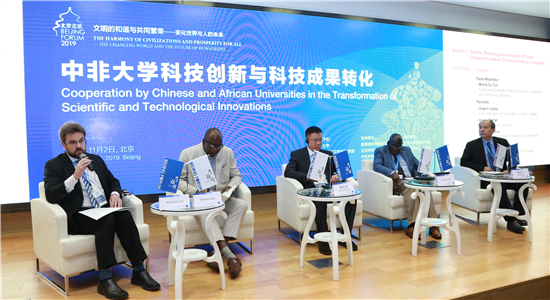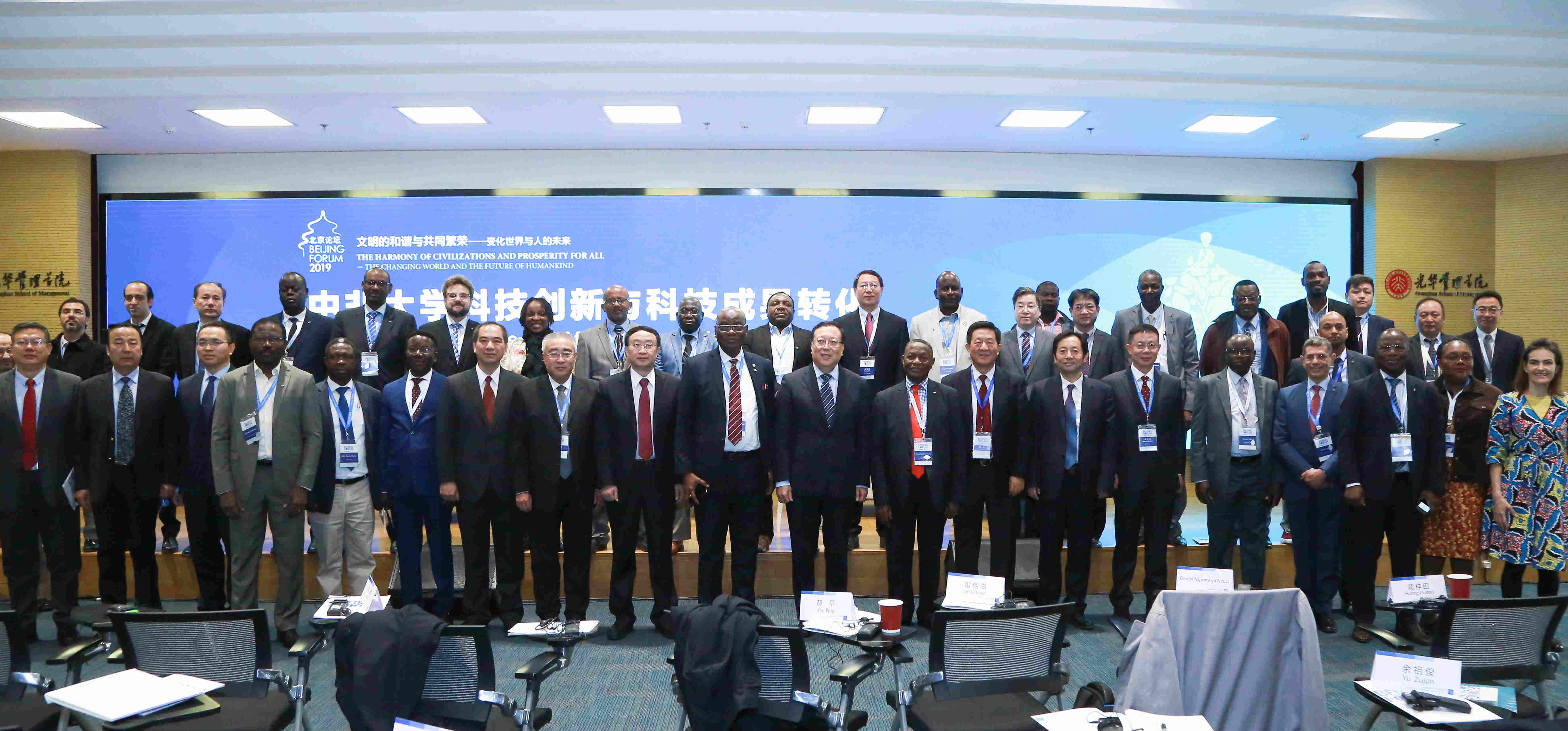[Beijing Forum 2019] Sino-African relations: How PKU takes a leading role in STI cooperation
Nov 06, 2019
Peking University, Nov. 6, 2019: Peking University has once again proven to be a leading higher institution in China, as it plays a pivotal role in beefing up cooperation with African institutions in terms of scientific and technological innovations (STI).
At the just concluded Beijing Forum, Peking University, in partnership with UNESCO, hosted a special panel session to discuss and forge formidable cooperation among Chinese and African universities in the transformation of STI. This cooperation is based on the mutual needs of Chinese and African universities, i.e. serving as hubs for technological advancement that will aid sustainable development of their nations.
Present at this special forum were high-ranking leaders from various Chinese and African universities, including Hao Ping, president of Peking University, Xia Wenbin, president of University of International Business and Economics, John Akelo Okum, deputy vice chancellor of Kenyatta University, Kenya, Oluwatoyin Ogundipe, vice chancellor of University of Lagos, Nigeria, among others.
In his speech, Hao stressed that Peking University will continue to strengthen its partnership with African institutions in the area of STI that will propel technological development of our nations. Hao also noted that it was a great pleasure for Peking University to host such a unique panel session, as it is highly relevant to the technological development of China and Africa.
“It is a great pleasure to host this important panel session that aims to strengthen Chinese and African universities cooperation in transforming science and technological innovations. Our cooperation is very unique and also crucial for the development of our nations, so we must work together diligently to build human capacities and come up with cutting-edge research,” Hao said.
“Peking University, in this regard, is willing to strengthen the existing cooperation with African universities and we are ready to bring in more African students for exchange programs. We are ready to take a leading role and we are willing to sustain this trend,” Hao added.
Beyond this, top leaders from African universities expressed appreciation to Peking University in return for hosting this special panel and stated how important this cooperation will significantly improve the quality of sci-tech research as well as the development of African countries.
 At the panel discussion
At the panel discussion
Emmanuel Luoga, vice chancellor of Nelson Mandela African Institution of Science and Technology, argued that the major challenge in Africa is the political will of the government to translate research outcomes into effective policies. He stated that there is huge gap between policy makers and academia, which severely affect the continent’s development.
“One big challenge of science and technology in Africa is that research findings are not translated into policies by our leaders. There is an existing gap between African policy makers and the academia, which makes it difficult for research findings to translate into meaningful technological development in the continent. But this is not the case in China,” He noted.
Also speaking of the challenge in Africa was John Akelo Okumu, deputy vice chancellor of Kenyatta University, Kenya, and Ibrahim Garba, vice chancellor of Ahmadu Bello University, Nigeria. The duo stressed that there is a weak link between African universities and the industry. They noted that the curriculum used in most African universities is obsolete and most African graduates could not meet the need of employers. Thus, they stated that this partnership among African and Chinese universities will greatly improve the quality of African education, the strength of research and the competence of graduates.
Hosting this unique forum is a display of leadership by Peking University. Under the auspices of the Beijing Forum, Peking University took the initiatives to host top leaders from over 12 African universities and about 15 Chinese universities to discuss possible partnership on STI. Hosting this panel session was a laudable effort and was hailed by all participants of both sides. The session provided leaders of African universities the platform to seek partnership that will address the continent challenges on promoting science and technology. The session also created a platform for Chinese universities to showcase their previous research outcomes and also seek cooperation with their African counterparts.
 Group photo of the attendees at the panel session
Group photo of the attendees at the panel session
This special panel was among several Sino-African cooperation sessions that Peking University had hosted in the past. On October 14, “Nyerere Day in China” special event was held at Peking University in memory of former President of Tanzania, Julius Nyerere. The event also aimed to strengthen China-Africa relations.
Over years, Peking University has constantly presented itself to be a hub to promote South-South cooperation, particularly Sino-African relations. This is evident through existing exchange programs with African universities, scholarship for graduate students that have facilitated cutting-edge research. With the support of the Chinese Government Scholarship scheme, Peking University has supported scores of African students to embark on research. For instance, hundreds of African students currently enjoy scholarship at Peking University, enabling them to gain access to world-class education.
“Peking University is taking the lead in promoting China-Africa relations. PKU is the first university in China to send its researchers to Africa,” said Professor Li Anshan, vice chairman of the International Scientific Committee of the General History of Africa (Vol. IX, X & XI).
The author is a Nigerian scholar of Yenching Academy at Peking University.
Reported by: Lukmon Akintola
Edited by: Huang Weijian

